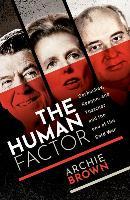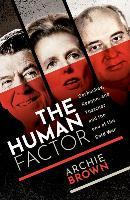The Human Factor: Gorbachev, Reagan, and Thatcher, and the end of the Cold War by Archie Brown
Winner of the Pushkin House Book Prize 2021
In this penetrating analysis of the role of political leadership in the Cold War's ending, Archie Brown shows why the popular view that Western economic and military strength left the Soviet Union with no alternative but to admit defeat is wrong. To understand the significance of the parts played by Mikhail Gorbachev, Ronald Reagan and Margaret Thatcher in East-West relations in the second half of the 1980s, Brown addresses several specific questions:
What were the values and assumptions of these leaders, and how did their perceptions evolve?
What were the major influences on them?
To what extent were they reflecting the views of their own political establishment or challenging them?
How important for ending the East-West standoff were their interrelations?
Paperback
Couldn't load pickup availability
Share

You Also Viewed

The Human Factor: Gorbachev, Reagan, ...
